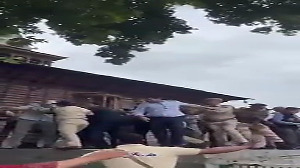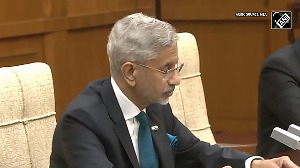It is widely accepted that the greatest literature is born when cultures, civilizations or worldviews come together. This often happens in case of diplomat-poets who often find themselves in exotic milieus, novel circumstances and in company of people with diverse viewpoints, says Abhay K.
There is a connection between diplomacy and poetry as several diplomats over the ages have excelled in poetry, to the extent that seven of them have won the most coveted prize in literature -- 'the Nobel Prize'. This is one of the least known literary facts.
The Nobel League of diplomat-poets includes Gabriela Mistral, Saint-John Perse, George Seferis, Ivo Andric, Miguel Angel Asturias, Pablo Neruda and Octovio Paz. Latin America has the largest share of Nobel Laureates in this category.
What is it that makes some diplomats excel in the fine art of poetry? Diplomacy is usually stereotyped as the fine art of wining and dining and diplomats as the lotus-eaters. The truth is that diplomacy is complex art that involves fine mixing of political acumen, cultural finesse, language abilities and conversation skills to wield the power of persuasion. Diplomacy is generally conducted in short sentences which reveal as much as much they hide. Poetry is no different.
The Nobel League of Diplomat-Poets
Gabriela Mistral (18891957) a Chilean poet-diplomat, was the first Latin American woman to win the Nobel Prize in Literature in 1945. Her real name was Lucila Godoy Alcayaga. Love, betrayal, sorrow, recovery, nature and Latin American identity as formed from a mixture of Native American and European influences are central themes in her poems.
She served as a consul of Chile from 1932 until her death, working in Naples, Madrid, Lisbon, Nice, Petrópolis, Los Angeles, Santa Barbara, Veracruz, Rapallo, and New York.
Saint-John Perse (18871975) was pseudonym of French poet-diplomat Alexis Leger who was awarded the literature Nobel in 1960. He was a career French diplomat from 1914 to 1940, after which he lived in the USA until 1967. His collected poems were published in 1971 under Bollingen Series, Princeton University Press.
Ivo Andric (1892-1975) was a Yugoslav poet-novelist and diplomat and winner of the literature Nobel in 1961. Andric started his literary career as a poet. In 1914 he was one of the contributors to Hrvatska Mlada Lirika (Young Croatian Lyrics). At the end of the war he published two books of lyrical prose -- one of them entitled Nemiri (Anxieties). During the Second World War, in the leisure imposed on him by the circumstances, Andric wrote his three large works, all of which were published in 1945: Na Drini Cuprija (The Bridge on the Drina), Travnicka Hronika (Bosnian Story), and Gospodjica (The Woman from Sarajevo).
George Seferis (19001971) was born in Urla, near Smyrna (now Izmir, Turkey). His actual name was Georgios Seferiades. He got the Nobel in 1963. Wandering and exile are present in Seferis's poetry. His collections of poetry include Strophe (Turning Point, 1931), E Sterna (The Cistern, 1932), Mythistorima (1935), and Logbook I, II and III (1940, 1945, 1955). Seferis entered diplomatic service of Greece in 1925. He was posted in England, Albania, Egypt, South Africa, Italy, Ankara, Lebanon, and Syria. Seferis served as Royal Greek Ambassador to the United Kingdom from 1957 to 1961. In 1962 he retired and moved to Athens.
Miguel Angel Asturias (1899-1974) was a Guatemalan poet, novelist, diplomat, and winner of the Nobel in 1967. Asturias's writings combine the mysticism of the Maya with epic impulse toward social protest. Asturias spent much of his life in exile. In the 1940s he entered diplomatic career, and served in Mexico, Buenos Aires, Paris and San Salvador during his diplomatic career spanning decades. The Nobel committee took special note of his little-known poetic cycle, Clarivigilia Primaveral (Clear vigil in Spring), calling it an "impressive" work that "deals with the very genesis of the arts and of poetic creation, in a language which seems to have assumed the bright splendour of the magical quetzal's feathers and the glimmering of phosphorescent insects."
Pablo Neruda (1904-1973) was the pen name and, later, legal name of the Chilean poet-diplomat Neftalí Ricardo Reyes Basoalto. He chose his pen name after Czech poet Jan Neruda. In 1971 Neruda won the Nobel Prize for Literature. Neruda became known as a poet while still a teenager. He wrote in a variety of styles including surrealist poems, historical epics and erotically-charged love poems.
Octavio Paz (1914-1998) was Mexican diplomat and poet, best-known for his works- Labyrinth of Solitude, Sun Stone and other love poems. He was a 1990 Nobel laureate, the first Mexican to win. His writing career began when he was only 19 with the publication of his first book of poems, Forest Moon. He was a career diplomat in the Mexican diplomatic service and during his long career served in New York, Paris, Geneva, Tokyo and New Delhi.
Diplomacy and Poetry
There are certain commonalities between the role of a poet and diplomat. A poet prepares the philosophical background or vision of a world -- a philosophical framework of how in future things could shape up. A diplomat implements that vision.
"Poetry is the ambassador of the spirit," write Tina Chang, Ravi Shankar, and Nathalie Handal, editors of Poetry for a New Century: Poetry from Asia. They add: "Poetry seems to us the most profound kind of diplomacy, one that can help generate more enduring conversation and understanding in the world."
Diplomats find themselves in unique situations because of their nomadic lifestyle and in their quest of finding a home away from home. Sense of exile from the motherland, a sense of loss and nostalgia for the motherland are frequently experienced by a diplomat while staying abroad. Poet W H Auden called a diplomat's life "this nightmare of public solitude." Creative diplomats start writing poetry, fiction or memoir to escape "this nightmare of public solitude," ordinary ones take to alcohol.
Life-long learning is hallmark of a diplomat. Diversity of exposure a diplomat gets can be truly unparalleled. A diplomat has a vantage point to look at things from a distance, with slight detachment. The time and space during his career a diplomat gets ample time and space at slightly relaxed stations of his posting to be at peace with himself and the world. Pablo Neruda wrote, "Poetry is an act of peace. Peace goes into the making of a poet as flour goes into the making of bread."
Poetry suits the best to diplomats because of its form and structure. A poem is generally a short, condensed literary device that can be created in a short window of opportunity usually a diplomat gets when inspiration hits him. The first rough draft can be revised time and again in more relaxed times to carve a perfect poem.
As a professional manager of international relations a diplomat has to send regular diplomatic dispatches on the country of his accreditation. A diplomat mixes with elite as well as the masses in order to perform his duties. During the course of time he becomes fluent in several international languages, develops acute sensibility, ability of sharp observation and precise communication. A poet is tad ahead of a diplomat in sensibility and exploration of subtle dimensions of thoughts and emotions of people.
It is widely accepted that the greatest literature is born when cultures, civilizations or worldviews come together. This often happens in case of diplomat-poets who often find themselves in exotic milieus, novel circumstances and in company of people with diverse viewpoints. No doubt so many diplomats have significant contributions to the art and craft of poetry.
Other significant diplomat-poets
The other significant diplomat-poets representing all inhabited continents and spread over seven centuries include Giovanni Boccaccio, Thomas Wyatt, Diego Hurtado de Mendoza, Constantijn Huygens, Matthew Prior, Joel Barlow, Aleksander Griboyedov, George Henry Boker, Robert Bulwer-Lytton, Abd al Aziz al-Amawi, Wilfrid Scawen Blunt , Luís Caetano Pereira Guimarães Júnior, James Rennell Rodd, Elena Vàcàrescu, Félix Rubén García Sarmiento , Paul Claudel, James Weldon Johnson, Abdul Hadi Dawai, José Gorostiza Alcalá, Jorge Carrera Andrade, Denis Devlin, Umar Abū Rīshah, Vinicius de Moraes, Douglas Valentine LePan, Robert Arthur Douglas Ford , Miguel Serrano, Valentin Iremonger, Cabral de Melo Neto, Máire Mhac an tSaoi, Nizār Qabbānī, Ahmed Fouad Shennib, Abioseh Davidson Nicol, John Russell Rowland, Eduardo Cote Lamus, Shathel Taqa, Salah Stétié, David Rubadiri, Salah Ahmed Ibrahim, John Weston, Ghazi Al Gosaibi Li Zhaoxing, Homero Aridjis, Nirupama Rao, Dhabiya Khamis, Indran Amirthanayagam, Reda Mansour, Amarendra Khatua, Georgios Veis, Peter Zsoldos, Mohhamad Elfitory, Zvi Gabay and Philip McDonagh.
Abhay K, a poet-diplomat is author of seven books including four collections of poetry. His forthcoming collection of poems is Seduction of Delhi.






